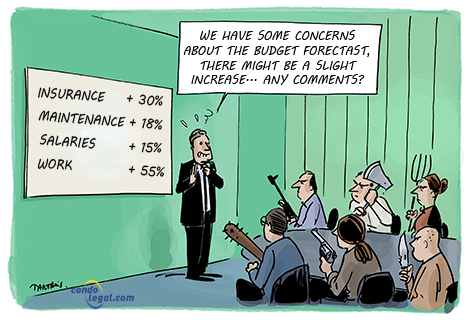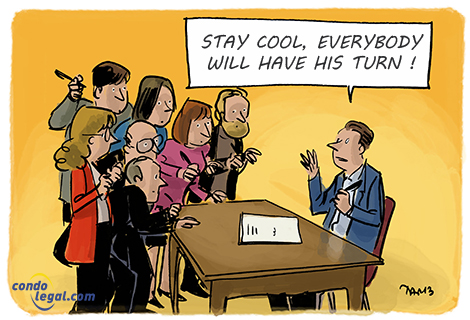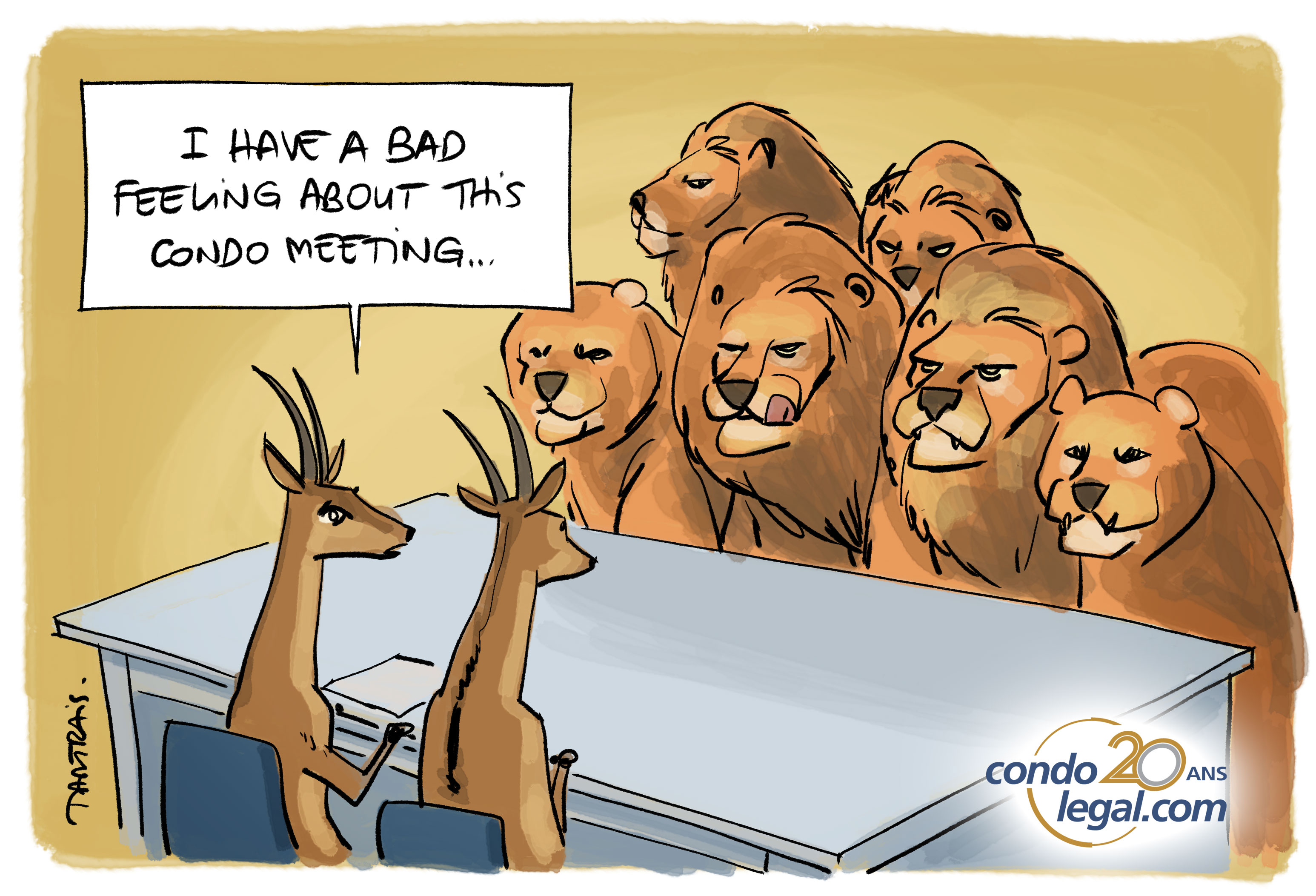
One of the essential moments of co-ownership is undoubtedly that of the meeting of co-owners. It is during this meeting that major decisions of the co-ownership are voted, such as the carrying out of certain works, the sale of a common portion and the modification of the declaration of co-ownership. Co-owners will also be able to debate and reflect on the directions to be given to their co-ownership. In addition, the assembly provides a unique opportunity to exchange ideas, resolve conflicts, and strengthen a sense of community. This is also the time when co-owners can ask questions about the management of the co-ownership, discuss common problems and propose solutions.
Preparation
The more carefully and methodically the meeting is prepared, the more motivated the co-owners will be and will want to attend. The topics discussed often require debates that sometimes require external interventions (e.g. architect, lawyer) in order to enlighten the co-owners on the final decisions they will have to make. The participation of co-owners is thus essential, because general meetings symbolize democracy within a co-ownership. In addition, it should be noted that the meeting of co-owners obeys specific rules that must be followed rigorously, otherwise the decisions taken may be invalidated.
Welcome
On the day of the general meeting, co-owners or their representatives are greeted by the meeting officers. This first step must be well coordinated. A table is normally set up at the entrance of the room, where the persons responsible for taking attendance take place. In order not to delay the proceedings, the co-owners should be invited to arrive some time before the session begins.
The participants
In principle, the general meeting being a private meeting, only co-owners can attend.Thus, the spouse of a co-owner who does not own the apartment she lives in, as well as the tenant or any other occupant who does not own the apartment, do not have the right to participate or vote at the meeting, even if their presence could still be tolerated by the president of the meeting. Nevertheless, a co-owner can give a proxy to the person of his choice, to represent him and vote on his behalf.
Attendance sheet
Upon arrival, the co-owner or his proxy (mandatary) must sign the attendance sheet under the supervision of the meeting secretary .His signature will then be validated and certified by the president of the meeting. The attendance sheet shall include, inter alia, the names of the co-owners or their mandatary. It also indicates the number of votes to which they are entitled. This sheet, to be kept as an appendix to the minutes, will serve more particularly to calculate quorum. This will determine whether the general meeting can be held or not.
The officers of the meeting of co-owners
It is mandatory to appoint a president and a secretary of the general meeting. Although there is no particular formula to be a good president, this function requires a certain amount of knowledge, experience and being tactful in the exercise of authority. Beyond the direction taken by the deliberations, the president must be an excellent host. His poise will not only set the tone of the general meeting and of the discussions, it will also ensure its smooth progress. Ideally, the election of the president of the general meeting should take place before the opening of the session, as the latter will have to:
Opening the meeting
The president calls the general meeting to order and declares the general meeting open. He declares that quorum has been reached, notes the time of the opening of the meeting and welcomes the participants. He must subsequently:
The general meeting deliberates, in principle, only on matters previously inscribed on the agenda, that is to say, before the general meeting. Other subjects can be debated, but they cannot be voted upon.
The debates
It is essential to insure the meeting of co-owners begins at the appointed time, and to manage the deliberations rigorously. Generally, each co-owner can speak, make comments and give his point of view on the management of the co-ownership. It is the ideal occasion to ask questions to the Board of Directors or the manager. The president of the general meeting must ensure the interventions are both respectful and relevant, and related to an item on the agenda. It is appropriate that participants talk only to the president of the general meeting, thus avoiding addressing directly a person or group of persons. The co-owners must not unduly delay the proceedings of the meeting. Any untimely intervention will tend to demotivate the co-owners, some of whom may no longer wish to attend general meetings.
Even if the president acts rigorously in the exercise of his duties, he cannot prevent co-owners present from in depth discussions of the matters at hand. The more difficult subjects on the agenda must therefore be treated as they should be, allowing the time necessary, although discussions cannot last forever. The more difficult subjects to resolve often involve the finances of the co-ownership, or even changing in the décor of common portions, such as the lobby. The president must be able to manage these debates respectfully and with due consideration, otherwise interpersonal conflicts may arise, and some co-owners feel excluded. The risk of them becoming disruptive during the general meeting are in such cases increased tenfold.
The presence of professionals
It may be useful that professionals mandated by the syndicate be present at the general meeting. These include, without limitation, accountants, notaries, lawyers and building professionals. They will have the occasion to present technical elements based on their expertise, thus allowing co-owners to ask questions. Their presence will also be a moderating influence during the debates.
Keep your meetings short
Some items are put on the agenda when they should not be. For instance, a vote to approve decisions taken by the directors in the previous year. Other questions should not be on the agenda, such as a vote to approve the financial statements, or any other matter for which the general meeting does not have jurisdiction.
Late arrivals and departures
Individuals arriving late at the general meeting, must also be registered on the attendance sheet. As for co-owners leaving before the general meeting is adjourned, they must inform the secretary of the general meeting that they are about to leave the premises.
Maximum length not to be exceeded
After a while, the attention of the participants in a general meeting diminishes. There is a risk that many co-owners may want to leave, which could result in the loss of quorum. Should this occur, any co-owner may request the adjournment of the general meeting. In order to avoid this unfavorable development, it is essential that the president of the general meeting evaluate, before the general meeting is held, the approximate time to be allocated to each item on the agenda. In short, he must strike a balance, between the subjects being treated fairly, and the general meeting dragging on forever. However, irrespective of the number of subjects to be treated, keep in mind that in a large co-ownership (e.g. 200 units), inevitably, the debates may last longer.
Adjournment of the General meeting
When all the items on the agenda have been dealt with, the president declares the general meeting adjourned. The time it ended will be indicated in the minutes.
 WHAT YOU SHOULD KNOW! Absenteeism is often very high at the general meetings of co-owners. To remedy this phenomenon, the directors must, between general meetings and from time to time, inform the co-owners of their achievements and decisions. By communicating this information through postings, e-mails and mailings, they may create growing interest among the absentee co-owners to the general meetings, who may therefore be enticed to participate.
WHAT YOU SHOULD KNOW! Absenteeism is often very high at the general meetings of co-owners. To remedy this phenomenon, the directors must, between general meetings and from time to time, inform the co-owners of their achievements and decisions. By communicating this information through postings, e-mails and mailings, they may create growing interest among the absentee co-owners to the general meetings, who may therefore be enticed to participate.
 WHAT TO KEEP IN MIND: A general meeting must be held in the city or region where the building is located. This is what declarations of co-ownership provide as a rule. Co-ownerships with a meeting room usually hold their general meeting therein.
WHAT TO KEEP IN MIND: A general meeting must be held in the city or region where the building is located. This is what declarations of co-ownership provide as a rule. Co-ownerships with a meeting room usually hold their general meeting therein.
 WARNING! A general meeting must be convened at a convenient time, so that co-owners can attend. While holding a general meeting on weekends is acceptable, it is best to schedule it on a weekday evening. It is up to the Board of Directors to exercise their discretionary and equitable judgment on this issue, which implies that it must act in good faith taking into account the characteristics of the co-owners concerned.
WARNING! A general meeting must be convened at a convenient time, so that co-owners can attend. While holding a general meeting on weekends is acceptable, it is best to schedule it on a weekday evening. It is up to the Board of Directors to exercise their discretionary and equitable judgment on this issue, which implies that it must act in good faith taking into account the characteristics of the co-owners concerned.
Back to the super factsheet ''The meeting of the co-owners''




